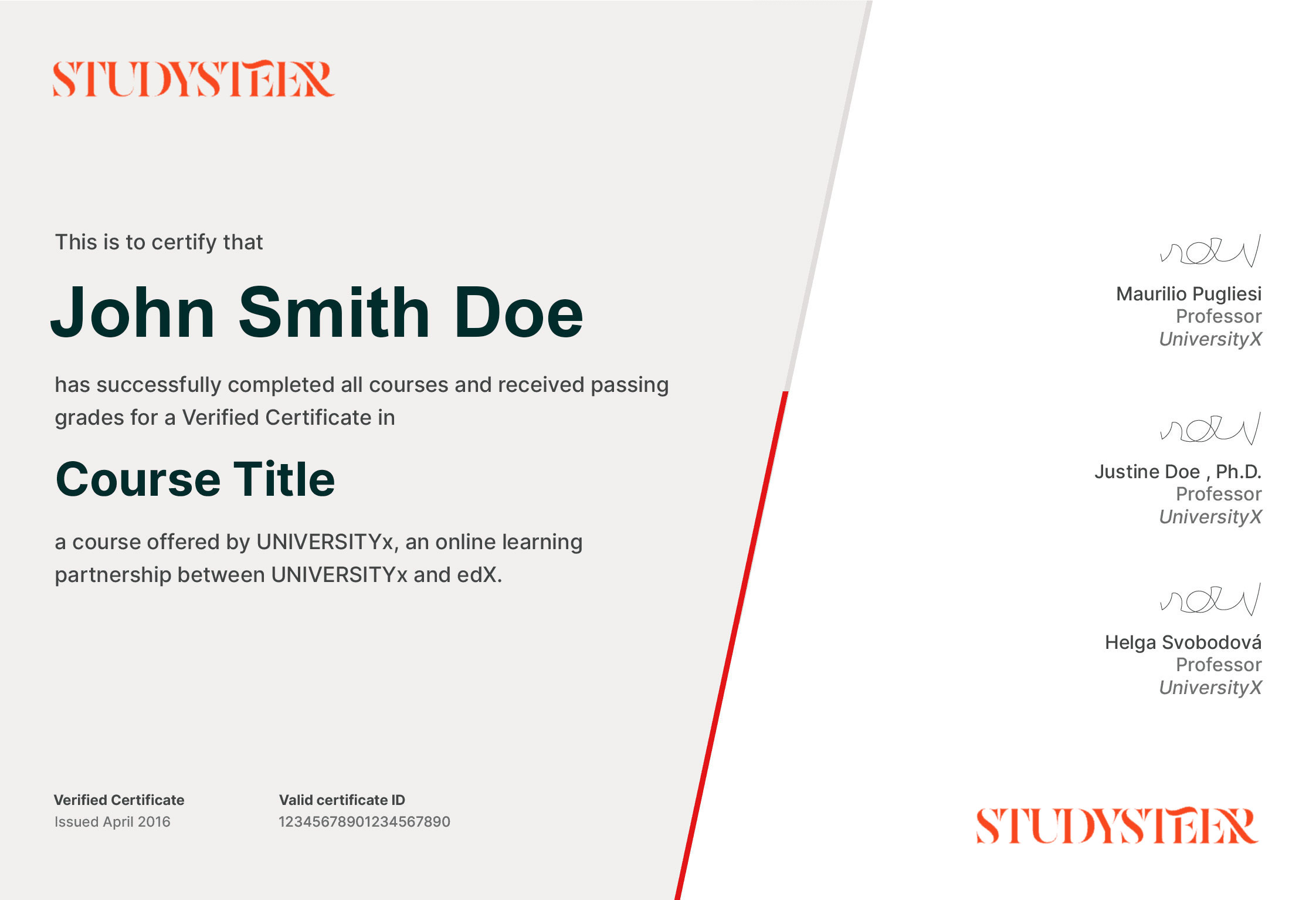Advanced Professional Certificate in Corporate Reporting
The learner will be able to understand, interpret and develop different reports and instruments to report the needed financial and non-financial information to the top management.
About the course
The Advanced Professional Certificate in Corporate Reporting aims to equip the learner with advanced knowledge of the concepts and methods used in corporate reporting by introducing different instruments and structures of financial and non-financial information that are needed to be reported in order to facilitate the decision-making at the top management.
The learner will be able to understand, interpret and develop different reports and instruments to report the needed financial and non-financial information to the top management.
Course details
Corporate reporting is a crucial aspect of any business, providing stakeholders with insight into an organisation's financial performance and sustainability.
After the successful completion of this course, you will understand the following;
Understanding Accounting Concepts, Principles and Theories:
- Understand accounting concepts.
- Learn various accounting concepts and principles.
- Concepts of accounting theory.
- Learn various elements of accounting theory.
- Learn financial statement fraud and its types.
- Define accounting and identify its importance in business.
- Discuss the history and evolution of financial accounting and its impact on modern business practices.
- Define financial statements and describe their purpose in providing a comprehensive view of a company's financial health.
- Analyze the components of a balance sheet and explain how it represents a company's financial position at a specific point in time.
- Examine the income statement and its role in showing a company's profitability over a period of time.
- Explain the purpose of a cash flow statement and its significance in assessing a company's ability to meet its financial obligations.
- Outline the key concepts of auditing, including its history, types of audits, the phases of an audit cycle, the role and functions of an auditor, and the essential skills required to perform a successful audit.
Preparation and Interpretation of Accounting Information:
- Accounting information and its importance in providing key financial data to various stakeholders.
- Identify the different users of accounting information, including investors, creditors, and management, and describe their specific needs.
- Explain the various bases of preparing accounting information, including cash and accrual accounting, and how they impact financial reporting.
- Categorize accounting into its various types, such as financial, management, and tax accounting, and describe their unique roles in business.
- Analyze financial statements, including the balance sheet, income statement, and statement of cash flows, and interpret the data to assess a company's financial health.
- Describe the accounting methods used for non-current assets, including property, plant, and equipment, and intangible assets such as patents and copyrights.
- Explain the accounting treatment of business acquisitions, including goodwill and other intangible assets, and the impact on financial reporting. Also, outline the accounting procedures involved in the liquidation of a company, including the disposal of assets and settling of liabilities.
- Define financial reporting and its importance in providing stakeholders with transparent and accurate financial information.
- Explain financial regulation and its key elements, including establishing rules and guidelines, oversight and enforcement, and protecting investors and the public interest.
- Identify the financial regulators in the UK, such as the Financial Conduct Authority (FCA) and the Prudential Regulation Authority (PRA), and their respective roles in overseeing financial markets and institutions.
- Describe the IFRS regulatory framework and its importance in providing global accounting standards to promote transparency and comparability in financial reporting.
- Explain the GAAP framework and its role in providing accounting standards and guidelines for financial reporting in the United States.
- Analyze the differences between principles-based and rules-based accounting and their impact on financial reporting.
- Discuss the benefits of a financial regulatory framework, including increased transparency, accountability, and investor confidence, and the potential impacts on business organizations.
- Define UK accounting standards and their role in promoting consistent and transparent financial reporting practices in the UK.
- Explain corporate accounting and its key activities, including financial analysis, bookkeeping, and financial reporting.
- Define accounting events and their role in recording financial transactions and events in an organization.
- Understand amalgamation in accounting and its impact on financial reporting in the context of mergers and acquisitions.
- Describe corporate accounting practices and policies and their importance in promoting consistency and accuracy in financial reporting.
- Analyze the differences between corporate accounting practices and policies and their respective roles in financial reporting.
Accreditation
All of our courses are accredited by the relevant partners and awarding bodies. Please refer to our information in about us for more details.Entry requirement
There are no strict entry requirements for this course. Work experience will be added advantage to understanding the content of the course.The certificate is designed to enhance the learner's knowledge in the field. This certificate is for everyone eager to know more and get updated on current ideas in their respective field. We recommend this certificate for the following audience.
- CEO, Director, Manager, Supervisor
- Accountant
- Auditor
- Financial Analyst
- Tax Specialist
- Chief Financial Officer (CFO)
- Finance Manager
- Investment Analyst
- Portfolio Manager
- Regulator
- Policy Analyst
- Business Executive
- Entrepreneur
Sample Certificate

Boost your career and your talents
With a validated certificate that demonstrates your learning, wow your employer.
Take up a challenge
All of us occasionally need an additional push. You stay motivated by working for a credential.
Let the world know about it
Using the special URL we give you, you may safely distribute your validated certificate to others.
Get started
Enhance your skills in leading online learning initiatives.
Tuition:
VEF 577,265,051
VEF 1,039,077,092
-
Access to this course.
-
Access to library.
-
Tests to boost your learning.
-
Digital certificate when eligible.
-
Learn at your own pace
How learners like you are achieving their goals
Participants in our courses don’t just learn new skills, they enjoy the experience too.
Zainab P.
EgyptExecutive Education
A smart way to enhance my knowledge within a short period of time, the course is very productive and beneficial for me...so grateful that i completed successfully...i would recommend my friends and family about the course.
Andrew S.
United StatesExecutive Education
Truly enjoyed the Strategic Management and Leadership Level 7 course and it provided me with a clear insight and helped me in my daily work as Plant Manager.
Richard T.
ScotlandExecutive Education
The modules were well structured, and gave me the knowledge to make sound decisions that maximize performance.
Rachel O.
NigeriaExecutive Education
I have learned a lot and gain experienced in this course. At first, I did not have confidence when standing front of audience but now, it is a different story.
Other related courses
Advanced Professional Certificate in Corporate Reporting
The learner will be able to understand, interpret and develop different reports and instruments to report the needed financial and non-financial information to the top management.
How a Professional Certificate Works
Upskill, reskill or pursue a passion with short courses across every subject, whether you’re a beginner or already an expert.

Find the Right Program For Your Career
Professional Certificate programs are offered in a variety of in-demand subjects to help you get ahead.

Learn & Gain Expertise at Your Own Pace
On your computer, tablet or phone, online courses make learning flexible to fit your busy life.

Earn a Valuable Credential
Showcase your key skills and valuable knowledge.

Stand Out in Your Field
Use the knowledge and skills you have gained to drive impact at work and grow your career.




